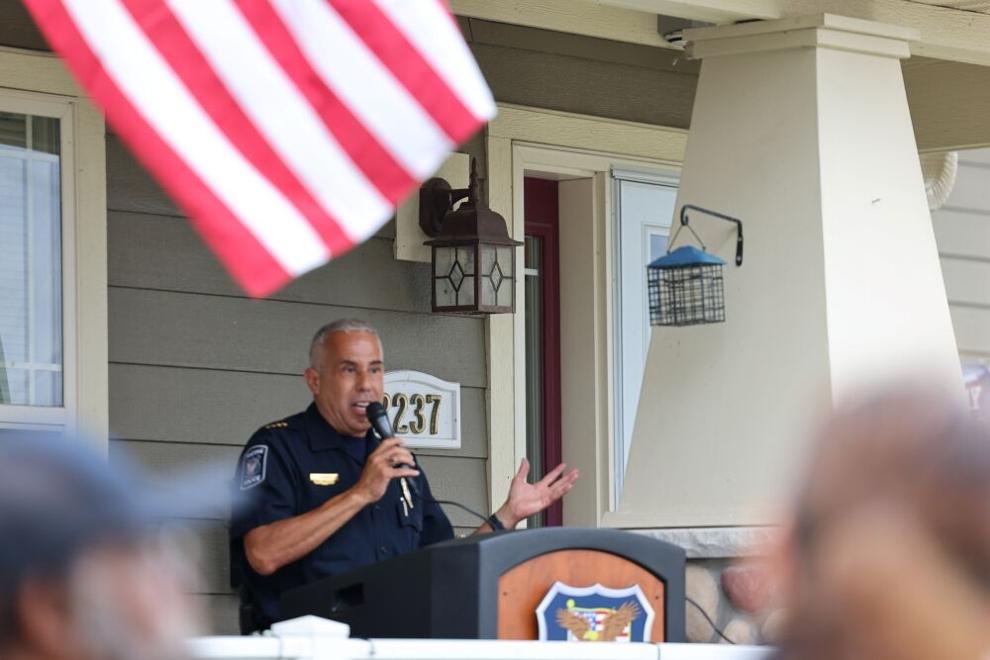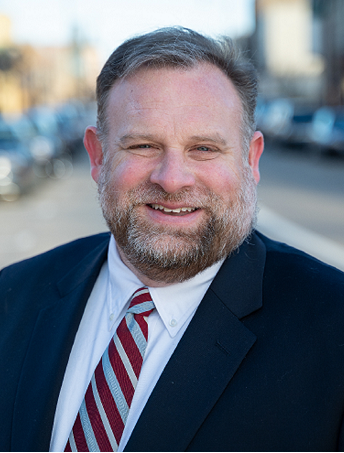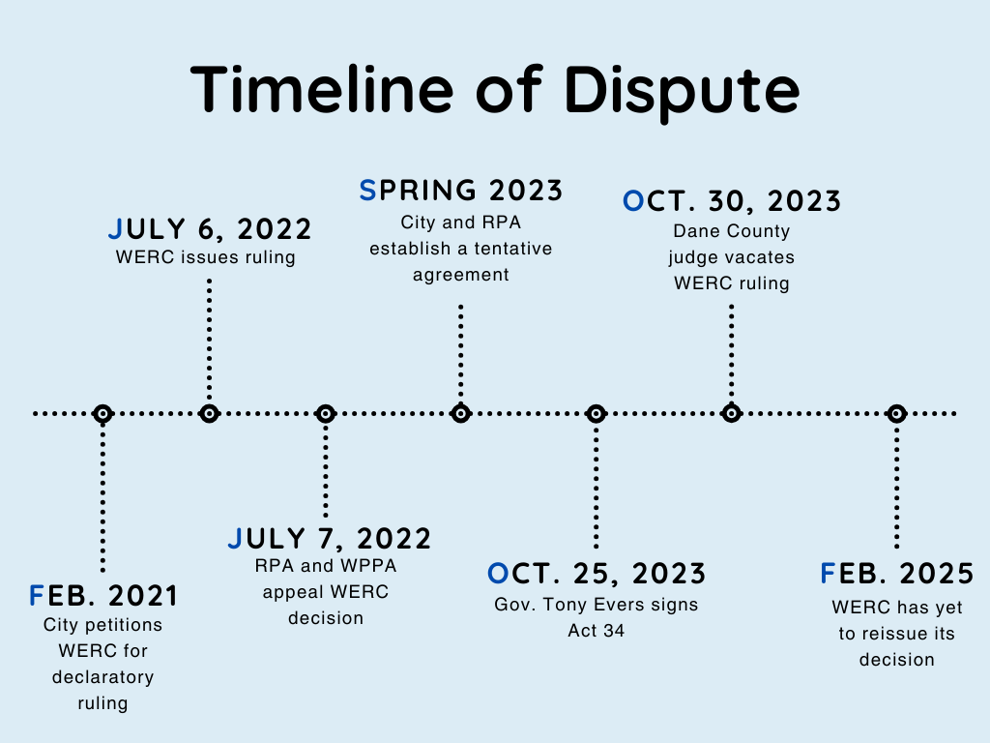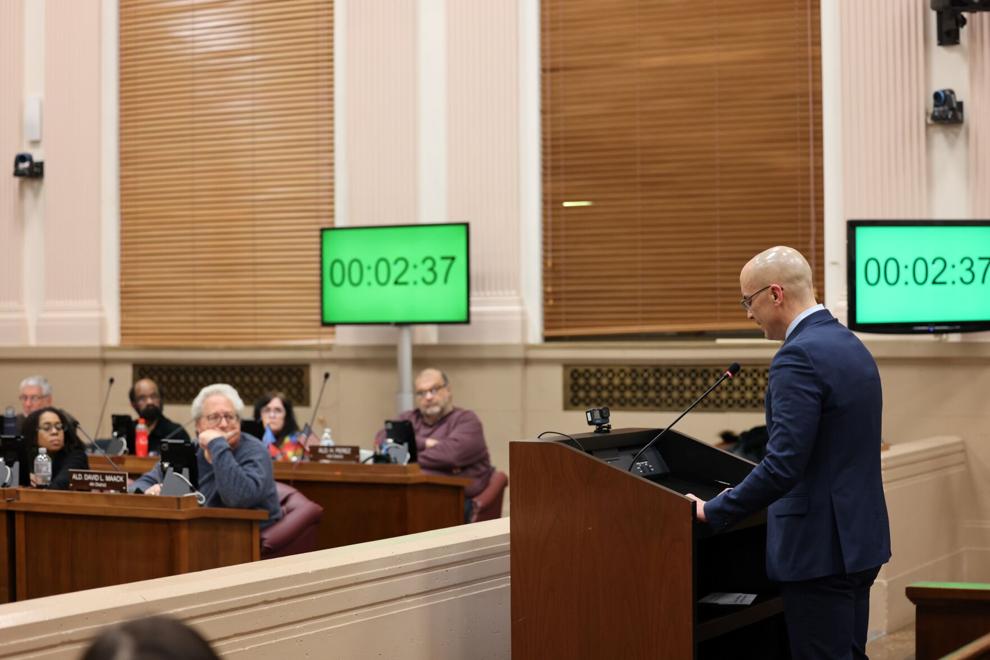Annie Pulley
RACINE — Racine’s police union has operated without a formal contract since 2021.
More than a dozen Racine Police Department officers who are members of the Racine Police Association attended the city’s Common Council meeting Feb. 4 to address just that.
“Racine’s officers have worked without a contract for five years, the longest of any group in the state,” said executive director of the Wisconsin Professional Police Association, Jim Palmer, who spoke during the public comment portion of the meeting. “This persistent conflict harms recruitment, retention and morale during a critical time when police agencies suffer from a lack of qualified candidates.”
The WPPA, based in Madison, is the parent organization of the Racine Police Association. It represents more than 11,000 active and retired members.
The linchpin in the dispute is whether the city has the legal ability to bargain with the RPA about healthcare benefits for, especially, retired police officers.
According to city administrator Jim Sullivan, who was hired in 2024, the city is eager to find a resolution that aligns with state law.
“I certainly hope to be able to guide the city and our PD and union through the process and get to a successful conclusion,” he said.
According to Sullivan, the city approved a tentative agreement with the RPA in spring 2023. This agreement is not an official contract, however.
From his perspective, the city continues to honor that agreement, which includes pay increases for police officers, who, on average earn about $100,000 a year, he said.
 |
| Sullivan |
Palmer recognized that the city has upheld most of its commitments and even provides retiree benefits via its employee manual.
“The employee handbook isn’t enforceable by anybody,” Palmer said. “The City of Racine can change that. That’s why we have collective bargaining laws. And so the contract actually matters, and what’s in the contract and what’s not actually matters.”
RPD Police Chief Alex Ramirez also weighed in via an emailed statement Feb. 7.
“The ongoing contract negotiations are a priority, and we are committed to resolving the dispute as quickly and fairly as possible,” he wrote. “We recognize that collective bargaining can be challenging, especially when there are differing interpretations between the parties. However, we understand that wages and benefits are critical to the morale of our officers and directly impact the retention of our dedicated personnel.”
 |
Racine Chief of Police Alex Ramirez addressed crowds at the National Night Out kickoff event at Lakeside Community Oriented Policing House in August 2024. |
History of dispute
The disagreement ignited in 2021 when the city asked the Wisconsin Employment Relations Commission for a declaratory ruling about certain portions of the police union’s proposed contract.
The city reportedly wanted guidance about whether the contract violated state law, namely 2011 Wisconsin Act 32, which strictly limited the topics for which public safety employees in public sector unions could bargain.
Act 32, and its sister law of Act 10, were passed in 2011. Both laws and their subsequent statutory revisions severely limit the viability of public sector unions in Wisconsin.
Mayor Cory Mason, formerly a state legislator, opposed Act 10 in 2011.
 |
| Mason |
healthcare benefits were not legal topics for bargaining.
In page eight of the 2022 decision, the commission states that it has “long held that municipal employers have no duty to bargain over insurance benefits for employees who have already retired inasmuch as those individuals are no longer bargaining unit employees.”
The commission also said the city is not obligated to provide such healthcare coverage.
Page seven of the WERC’s decision states that “the Commission concludes that the City’s position is correct. This proposal is a prohibited subject of bargaining because it mandates the existence of a City health insurance plan.”
Soon after the WERC announced its decision, the RPA along with the WPPA, appealed the decision in the Dane County Circuit Court.
Racine’s International Association of Fire Fighters union, Local 321, also appealed the WERC’s decision.
On Oct. 30, 2023, Dane County Circuit Court Judge Jacob Frost vacated the WERC’s ruling and denounced the commission’s conclusion that municipalities have no obligation to provide healthcare.
“Per WERC’s interpretation, only if a municipal employer chooses to offer a health plan must it collectively bargain with the public safety employees regarding how the employer and employees split responsibility for the premium owed on the plan,” Frost wrote. “This interpretation ignores rules of statutory construction and renders absurd results. I therefore reject it.”
Frost ordered the WERC to vacate its ruling and release another decision.
Just days before Frost’s ruling, the state Legislature amended a key statute by passing 2023 Wisconsin Act 34, which clarifies Acts 10 and 32.
The statute notes that the existence of municipal healthcare is a guarantee and that who is covered by that plan is not a prohibited topic of negotiation.
State senator and former RPD police officer Van Wanggaard represents the 21st Senate District in southeast Wisconsin.
One of the senator’s representatives shared a statement from Wanggaard at the Common Council meeting Feb. 4.
“I wrote the bill that eventually became 2023 Act 34,” Wanggaard’s statement read. “We clarified 2011 Acts 10 & 32, and 2013 Act 20 to state affirmatively that the existence of health care coverage, and who is covered by that health care plan is not considered ‘health care design’ for the purposes of the law, and is therefore negotiable for public safety employees. It passed the Legislature unanimously, and was signed into law by Governor Evers.
“There isn’t any gray area here,” the statement continued. “The law has been clear for 10-15 years. And the gray area that Mayor Mason pretended to see in those laws have been cleared up for 2 years.”
Ongoing disagreement
According to Palmer, whose organization represents about 300 local unions statewide, the city’s decision to ask for the initial WERC ruling contradicts historical practice.
Palmer said in an email that “The existence of retiree health insurance goes back more than 20 years in the contracts between the City and the RPA … it was specifically included in the four collective bargaining agreements following the passage of Act 32 in 2011.”
Sullivan couldn’t recall whether retiree benefits were included in contracts after 2011 but noted that the city attorney would be able to clarify.
The Journal Times has not yet received a response after a Feb. 7 request for clarification from Sullivan or the city attorney.
Palmer said Racine County, Franklin, Eau Claire, Lake Geneva, Hartford, Wauwatosa, Whitefish Bay and Kenosha are just a few examples of municipal employers who have bargained for retiree health insurance in Wisconsin.
“All of this kind of begs the question, is Racine the smartest city in the state in figuring something out that no other municipality has, or is it more likely that Racine is out in an island on this issue?” Palmer wrote in his email.
 |
Major points in the five-year contract dispute. |
Current landscape
According to Sullivan, the city has been waiting 15 months for the WERC to reissue a decision.
“We will absolutely abide by the terms of the WERC decision,” he said. “That does not mean that the city has the resources to be able to pay these kind of open-ended benefits.”
Sullivan said that the city offered a referendum in 2022 to increase funding and benefits for the RPD and its officers. However, it was rejected by voters.
If the WERC reverses itself and the city and RPA are still unable to reach an agreement, Sullivan said the goal would be to resolve the matter via mediation, and if that fails, through binding arbitration.
“We are trying to fund and maintain the best police force that we can within our means, recognizing the fact that there are very limited resources in the City of Racine and that we need to be able to maintain the streets and the water system and the parks,” Sullivan said.
Racine police respond
Kevin Kupper, an RPD investigator and the president of the RPA, said the department has about 183 members, 27 of whom are either in the academy or in field training.
RPD is authorized for 196 sworn officers, and in recent years has seen more than a dozen officers leave for other law enforcement agencies, including the Racine County Sheriff’s Office.
“It is essential that we retain the hardworking men and women who serve and protect this community and that they feel valued and supported,” Ramirez wrote. “Reaching a fair and equitable agreement on this contract is a vital step in ensuring that we can continue tosheri support our officers and maintain a strong commitment to the safety and well-being of our community.”
Act 10 overturned
Frost, the same Dane County judge who issued the opinion vacating the WERC’s ruling in 2023, also overturned major portions of Act 10 in December 2024.
He has since stayed his opinion, and the case likely will go to the Wisconsin Supreme Court.
According to Palmer, the WPPA doesn’t believe that changes to Act 10 will affect their case because Act 10 is more relevant for general public employees, whereas Act 32 deals with public safety employees specifically.






No comments:
Post a Comment